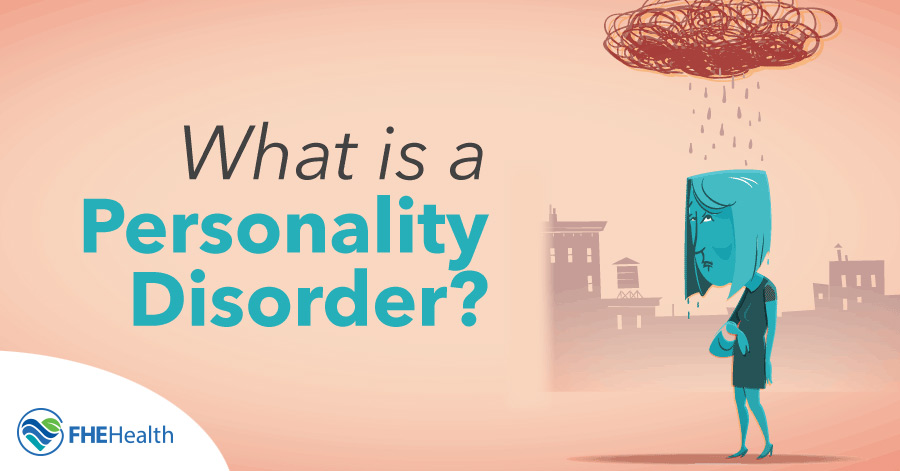
How Are PDs Diagnosed?
Personality disorders (PDs) are diagnosed by professionals with time and observation. The patient needs to have a history of issues of their disorder causing problems with themselves and other people. The effects of their suspected disorder need to impact their life before someone will take the idea of a diagnosis seriously.
Along with that, they also need to show the stability of symptoms or behaviors across their life. In essence, the psychologist wants to be sure that what’s going on isn’t a phase or a bout of anxiety or depression. They need to be sure that there aren’t external factors causing the behavior.
That’s more complicated than it sounds. It’s hard to prove that there aren’t connections to other things in life – since most psychologists now believe that the development of disorders and life experiences is all connected through the bioecological model. To understand what that means, we need to give you a quick refresher.
The Bioecological Model
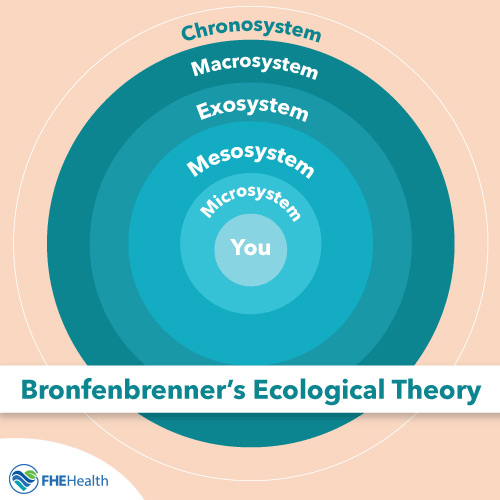
Next, we have the mesosystem. That’s the interaction (think the ring or barrier) between our inner circle and the outside world. While a child’s schoolmates are considered in the microsystem – a parent’s relationship with their teacher is the mesosystem. Why? There are now two levels of interaction, the relationship of the parent to their child acts upon the relationship of the parent to the school. We don’t need to go into every system of the model to get our point across.
In terms of personality disorder diagnoses, the bioecological model shows us how complicated it is to source the “cause” of suspected behavior. For a true diagnosis to exist, the professional needs to understand that no one is acting on the individual and causing them to act this way. That’s not to say that something in their development couldn’t have spurred a personality disorder. The brain is complicated, what can we say?
Physical Evaluation
After the doctor or professional looks into the environmental factors, they’ll examine your health. This is to see if your behavior is linked to a personality disorder or drug/alcohol use.
People also see extreme personality changes when they have things like brain tumors or even well-progressed syphilis. They want to rule out any physical factors that can lead to changes.
DSM-5
Finally, the professional will take the list of your symptoms and compare them to the DSM-5. This is essentially the bible of psychology.
It holds the official and agreed-upon criteria to diagnose every mental disorder that we know of. It also lists symptoms and statistics to help professionals decide between one disorder and the other.
What is a Personality Disorder Officially?
Before we get into each specific disorder, we’ll look at the general criteria for diagnosis. For someone to officially be diagnosed with a PD, they need to check off at least two of the following options.
- The suspected disorder affects self-perception and world perception.
- The disorder causes an inappropriate emotional response to circumstances.
- It changes how you act in relationships and whether or not you are successful.
- There are impulse control issues.
If the professional can mark off two of the four symptoms (or more), they’ll look to narrow down the diagnosis further.
What Types of Personality Disorders Are There?
There are about ten personality disorders individually, but there are three categories. The categories refer to the main emotion or thought processes of the disorder and are called A, B, and C.
The three personality clusters include:
- Cluster A – Odd, Bizarre, Eccentric behaviors
- Cluster B – Dramatic or Erratic
- Cluster C – Anxious or fearful
Under cluster A, we see personality disorders like paranoid personality disorder, schizoid, and schizotypal.
Cluster B houses most of the personality disorders you’ve heard of. That includes antisocial, borderline, histrionic PD, and narcissism.
Finally, the disorders in cluster C include anxiety disorders. Those consist of avoidant, dependent and obsessive-compulsive personality disorders.
Personality Disorders: Cluster A
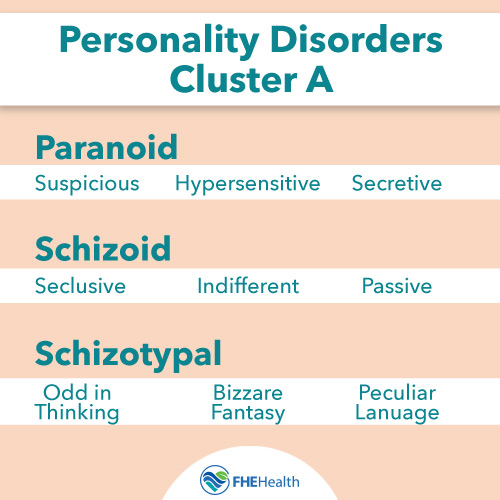
They could be presented with the same information and situation as someone else, but their thoughts are governed by the disorder. The type of thoughts depends on the specific disorder.
Paranoid Personality Disorder
Someone who has paranoid PD has trust issues, but on the deepest level. Their brain doesn’t let them trust people, to the point that they can’t have relationships with even the people in their microsystem. They always assume that people are out to get them. Not in the “there are people out to get me” way, but they misinterpret even the best intentions. To avoid getting hurt, which is what they’re most afraid of, they avoid people. Putting themselves at a physical and emotional distance is a classic way to cope with this PD. If they think someone is about to harm them or they suspect they have bad intentions, it’s not strange for them to lash out.
People with paranoid PD live very hostile lives and normally don’t have a large if any, circle of friends and family. They can have trouble holding jobs as well. Not only are they preoccupied with keeping themselves safe, but their PD changes the way they interact with clients.
Schizoid Personality Disorder
This isn’t a very common disorder, so we won’t go into that much depth. People with this personality disorder are what you would call “loners.” They choose solitary activities whenever possible and don’t like social interaction. They can seem like they’re cold and emotionless. For good reason. One of the telltale symptoms of schizoid PD is having a smaller range of emotions than normal. At least when it comes to expressing them to other people.
Schizotypal PD
Someone who is schizoid keeps to themselves, which they see as a choice. They have distorted thoughts when it comes to relationships and emotions, but that’s it.
Schizotypal, on the other hand, includes erratic behavior and cognitive issues. These are people who will see things that aren’t there – at least to other people. Sometimes, they believe they hold special powers, like magic or live some type of fantasy. You know the movie trope of someone wearing a tin foil hat because the government is stealing their thoughts? That’s classic Schizotypal behavior. Before you link the two in your head, schizotypal PD and schizophrenia are different. People with schizophrenia are more severe and involve a diagnosis of psychosis. Scientists think that the two are linked – and we see the mild disorder popping up in families where there is a schizophrenic classification. What gene is responsible for this assumed genetic correlation – we don’t know.
You could get into the argument that schizophrenic behavior influenced the development of the personality disorder – but that’s another article entirely.
To refresh before we move on – the three disorders under cluster A are ones that encompass odd or eccentric behaviors.
Cluster B Personality Disorders
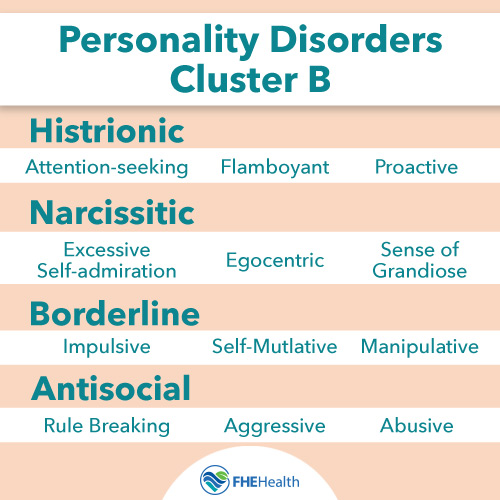
There are four disorders in this cluster.
Antisocial Personality Disorder
Those with antisocial personality disorder don’t care about other people. Not only do they not have emotions for them, but they don’t have respect for their rights or thoughts.
Many people with the disorder are reckless and hostile. They often are aggressive and will “play” with people by manipulating their emotions. Along with using people, they also are reckless with their own behaviors and often cause large scenes. This could be setting fires, driving super fast, or hurting people for fun. They don’t feel remorse or empathy, though they learn how to fake it.
Borderline PD
We know a lot about people who have borderline personality disorder because the way it manifests is so extreme. Have you heard of the idea of black-and-white thinking? Either something is this or it’s that, there’s nothing in-between. That characterizes borderline personality disorder well. People with this PD are quick to judge and have two versions of themselves.
Depending on the day and the current life circumstances, they’ll view themselves as all good or all bad. They change jobs, relationships, decisions – anything – all the time, often without warning.
Histrionic Personality Disorder
We don’t often talk about this as a disorder, but we accuse people of the symptoms a lot. People with histrionic personality disorder are literal drama queens.
They’re driven by a need to create drama and to always be the center of attention. They will over-emotionalize and exaggerate their relationships with other people. Their over-the-top (and then some) expressions of emotions and even daily dress make it hard for them to keep a stable circle of friends.
Narcissistic Personality Disorder
Probably the most known on this list, people who have this personality disorder have a very twisted view of themselves. They view themselves in very high regard, which usually manifests as being elitist. They genuinely believe they deserve more/better treatment and resources than others. This belief that they’re better than everyone doesn’t bode well for their relationships. They will disregard others entirely in favor of themselves. ‘
Cluster C
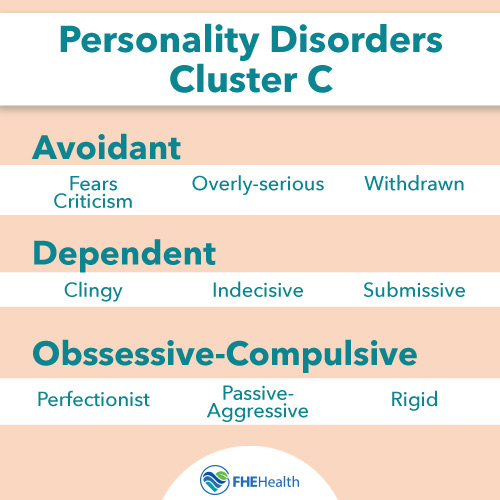
Avoidant Personality Disorder
There are similarities between antisocial disorder in cluster b and avoidant personality disorder. However, someone with avoidant PD cares deeply about what other people think. They have pervasive and invasive thoughts that other people will judge and ridicule them. They’re afraid of being misunderstood and even more afraid of being laughed at. Therefore, these people go out of their way to avoid social interactions. They have a very low self-worth and benefit from anxiety treatment.
Dependent Personality Disorder
If someone has a dependent personality order, it’s not that they can’t take care of themselves, but more that they obsessively want someone else to. Most therapists think that they can only process people caring about them when they perform care. They have an intense fear of losing people and of being alone (and having to take care of themselves). To avoid being alone or losing relationships, many people with this PD resort to abuse. Emotional abuse and manipulation keep people around, which is enough to condone their behavior to themselves.
Obsessive Compulsive Personality Disorder
When it comes to what we think of as OCD, there are generally three versions. You can have obsessive-compulsive thoughts, behaviors, or both. The personality disorder can manifest in different ways at different times. People with this PD are so driven by their perfectionism that it turns into paralyzing fear. They are rigid and unable/unwilling to stop behaviors because if they don’t get it right, something terrible will happen.
Treating Personality Disorders
Before you get overwhelmed and diagnose yourself – it’s unlikely you’d get to this point in your life without knowing you had a personality disorder. If you suspect something, feel free to bring it up with a therapist, but don’t obsess.
Personality disorders aren’t a death sentence. They can be treated with extensive therapy and a wide variety of medications.
The hardest hurdle to treating personality disorders is getting the patients to stick to their treatment. By nature of their disorders, they’re impulsive and don’t excel at consistency. Knowing what is a personality disorder for one person may look slightly different than the same disorder for someone else. Some people, especially those with anxiety disorders, will self-medicate with drugs and alcohol. If you think you know someone like that, talk to them (gently) about rehab.






